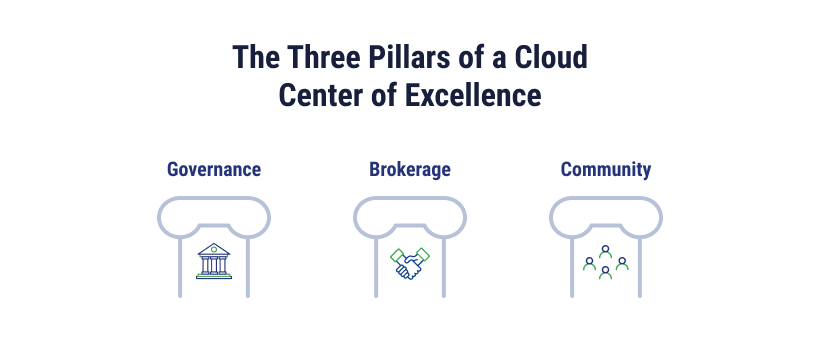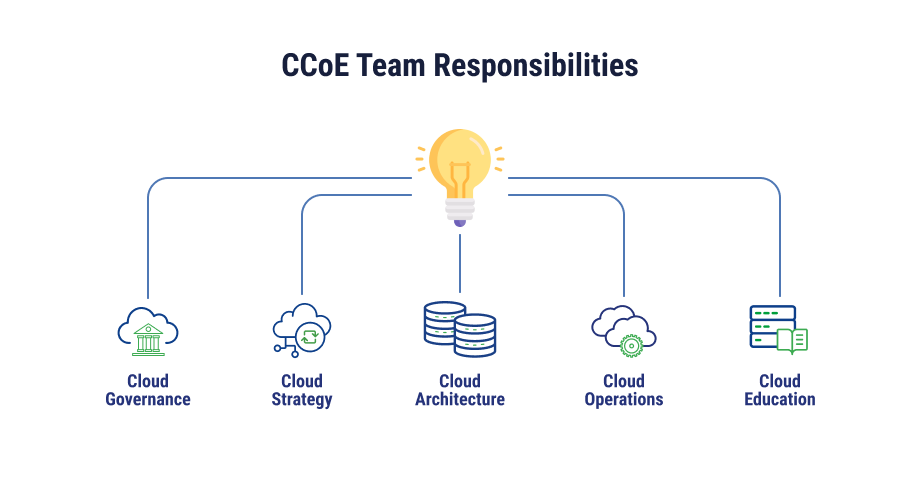
Cloud computing has enabled organizations to scale their operations, boost agility, and reduce costs in revolutionary ways. However, it can be challenging and complex to manage well, especially if your IT team lacks cloud-specific expertise. This is where a cloud center of excellence (CCoE) comes into play. We’ll talk about what a CCoE is, the benefits it can bring to organizations, and the roles held by specific team members.
What is a Cloud Center of Excellence (CCoE)?
A cloud center of excellence (CCoE) is a team dedicated to employing best practices, guidelines, and governance in the cloud. Any cloud migration or cloud adoption efforts would also be handled by this group.
Successful CCoEs should include people with varied skills – cloud engineering, cloud architecture, cloud security, and cloud compliance, for example. The team should also fully understand the underlying business goals and objectives. A CCoE can either operate as an in-house team or come from a third-party vendor.
Why is Cloud Center of Excellence Important for Organizations?
Building and implementing a cloud center of excellence (CCoE) can serve several important roles at an organization. According to a Forrester survey, a CCoE can improve security posture by developing and implementing security best practices and governance policies. When well-aligned with business objectives and focused on optimization, a CCoE can also reduce cloud waste and save businesses money.
Because CCoE teams have a wide range of skills, these teams can also enhance innovation, decrease cloud-related risks, and enable businesses to be more agile with the deployment of cloud resources. Additionally, a CCoE is important for organizations because it fosters innovation through the exploration of novel cloud services and technologies – it promotes experimentation and prototyping to evaluate the viability and potential advantages of emerging cloud solutions.
What Are the Benefits of Cloud Center of Excellence?
There are many benefits of cloud centers of excellents that align with its three pillars of governance, brokerage, and community.

CCoE teams can improve the security posture of a business, make better strategic decisions, improve communication between cloud experts, improve agility and innovation, and even reduce costs in the cloud.
Increased and Enhanced Security
A CCoE can work as a team to develop and implement best practices from a security and governance standpoint, such as:
- Establishing and documenting security policies, standards, training, and awareness
- Enforcing security policies and standards throughout the organization
- Performing regular security audits
- Guaranteeing proper authentication and authorization (IAM)
- Setting up requirements for at-rest and in-transit data encryption
- Establishing continuous threat monitoring and detection mechanisms
- Outlining incident response and remediation procedures
- Implementing vulnerability scanning
- Conducting regular resource vulnerability scans
Strategic Decision Making
Because people are migrating to the cloud from different areas of expertise, these diverse perspectives can converge to spur on more strategic decision-making. For example, experts on cloud cost optimization may not be thinking about implementing necessary security tools that may increase costs short-term, but by discussing options collectively, CCoE teams can reach a consensus on how to move the business forward.
Enhanced Collaboration and Communication
Having everyone on the same team is the first important step to getting everyone on the same page, collaborating and communicating more effectively. Instead of having team members in their own silos, a CCoE acts as a central hub for sharing experiences, lessons learned, and information related to:
- Cloud technologies
- Cloud migrations
- Cloud implementations
Improved Cloud Agility and Flexibility
Creating a more collaborative environment also increases cloud agility and flexibility. Cloud resources can be provisioned and deployed more quickly when a CCoE is communicating more openly and regularly.
Increased Innovation
By making more decisions with more complete information, improving the ability to communicate and collaborate, and increasing the agility of operations, a CCoE can also enhance innovation at a company. More people working together on the cloud will also bring varied perspectives and expert opinions on the latest cloud technologies and best practices, making everyone better.
Cost Savings
Gaining a more comprehensive view of the cloud also helps organizations reduce cloud waste and save cost. A CCoE can unearth opportunities to save money by optimizing cloud usage. How? By evaluating usage patterns, optimizing resource allocation, and establishing effective budgeting and forecasting procedures.
What Are the Roles and Responsibilities of a Cloud Center of Excellence Team?
All team members who are part of a cloud center of excellence will serve as advocates for the cloud and be responsible for ensuring the cloud is implemented and managed correctly. However, different members will have a different combination of skills and may focus on specific areas of the cloud, including governance, strategy, architecture, operations, and education.

Cloud Governance
Team members focus on governance will work to develop the procedures, policies, and standards for operating in the cloud. Cloud governance experts will also need to oversee any necessary compliance efforts, which could include HIPAA, SOC models and standards, GDPR, and more.
Billing and cloud costs can also be handled by cloud governance. These team members should monitor and manage costs associated with the cloud and recommend opportunities for optimization.
Cloud Strategy
Just because cloud architecture is popular doesn’t mean that all of an organization’s workloads need to in the cloud. A solid cloud strategy is essential for making wise decisions and tailoring the cloud to your specific business requirements.
Cloud strategy specialists can help build a strategy that aligns with an organization’s unique needs, as well as evaluate cloud platforms, providers, and options to determine what solutions and services are the best-fit based on workload requirements. Additionally, they can create and implement cloud migration plans and manage the cloud once it’s implemented.
Cloud Architecture
Cloud architects work alongside cloud strategy pros to develop a cloud solutions framework that’s appropriate for your business. Their work can include approving cloud architecture designs, providing support for strategists and operations experts, and developing standards for cloud architecture.
Cloud Operations
After implementation, your cloud infrastructure and services will require ongoing support to maintain performance and strong security. Cloud operations team members can manage cloud services, perform necessary troubleshooting, keep an eye on performance and availability, and implement security measures or upgrades that align with compliance requirements.
Cloud Education
Even employees not dealing directly with the cloud need to understand how it works, and that’s where cloud education team members play a role. These experts will create cloud training programs and share them with users. They may provide one-on-one cloud support for those who need it and create and maintain documentation that support more personalized trainings. Being a champion for the cloud and advocating for its widespread adoption will be a role shared by all members of the CCoE.
How to Build Your Cloud Center of Excellence with a Trusted MSP
Unless your business is at an enterprise level, it can be struggle to form a comprehensive in-house cloud center of excellence. The cloud skills gap is an ongoing challenge for businesses, especially when it comes to finding qualified new hires. A trusted managed service partner (MSP) like TierPoint can fill in these gaps and either partially or completely fulfill your CCoE needs.
Need help along your journey to the cloud? Download our eBook for tips and tricks to maxmize the benefits of the cloud.

FAQs
The three pillars of the Center of Excellence are Governance, Expertise, and Empowerment.
An AWS Cloud Center of Excellence is a team that develops adoption and migration efforts in AWS, developing the governance policies, best practices, and cloud guidelines for AWS.
An Azure Cloud Center of Excellence is a team that develops adoption and migration efforts in Azure, developing the governance policies, best practices, and cloud guidelines for Azure.
The main difference between a cloud center of excellence (CCoE) and a cloud center for innovation (CCI) is the focus of the center. CCIs are concerned with innovation, whereas CCoEs focus on governance.
